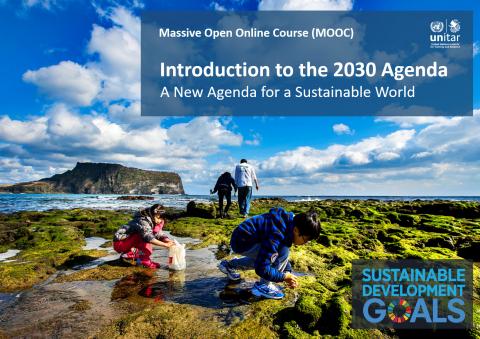
Introduction to the 2030 Agenda: A New Agenda for a Sustainable World (MOOC)
2015 was marked by the adoption of four landmark UN agreements: Sendai Framework for Disaster Risk Reduction, Addis Ababa Action Agenda, 2030 Agenda for Sustainable Development and the Paris Agreement. This online course has been designed to provide an in depth analysis of the 2030 Agenda, drawing on the synthesis from the Secretary-General, the inputs received from stakeholders, the wealth of knowledge produced by the Technical Support Team, and contributions made by 22 United Nations entities to a series of delegates’ briefings organized by UNITAR during the negotiations within the Open Working Group on Sustainable Development Goals.
This course is self-paced, you can register anytime and complete the course before the end of the course.
This course has been designed, specifically, with a view to addressing the knowledge needs of the public and raise awareness regarding the 2030 Agenda for Sustainable Development.
Following the completion of the course, participants will be able to:
- Define the key reasons behind the convergence between MDGs and sustainable development tracks;
- Explain the difference between the MDGs and the 2030 Agenda;
- Identify main challenges in each Sustainable Development Goal;
- Analyze the changing nature of Global Partnership;
- Identify the importance of review and follow-up for the implementation of the 2030 Agenda;
- Discuss the challenges of national evaluation systems, capacity, and capacity development in the framework of the follow-up and review processes.
The course provides analytical tools to raise awareness about the Agenda 2030. The course consists of 6 modules:
- Introduction to the Post-2015 process and the origins of the 2030 agenda;
- From the MDGs to the 2030 Agenda: a call for transformative action;
- The Sustainable Development Goals: policy integration and synergies;
- Leveraging resources, working with partners: The implementation of the 2030 agenda;
- Follow-up, review and data for the 2030 Agenda;
- Evaluation and the 2030 Agenda.
This self-paced course consists of six modules developed around the overall learning objectives, as well as second-level learning objectives specific to each module. The estimated learning time per module ranges from 2 to 5 hours. Modules can be followed separately if a participant is only interested in catching up on some specific issues. Each module is developed as an interactive presentation complemented by a set of exercises (formative assessment), which can be taken either prior or after the consultation of the content of the module helping to improve the understanding of the issues discussed. Additional exercises, such as case studies and other tasks, are also proposed for some of the modules. Each module is followed by an objective multiple-choice assessment (summative assessment).
This course has been designed, specifically, with a view to addressing the knowledge needs of the public and raise awareness regarding the 2030 Agenda for Sustainable Development. It is open to everyone interested to learn more about the nature of the process, its interlinkages with other major intergovernmental negotiations, as well as the outcome of the Post-2015 debate. Participants can follow the course at their own pace, and can earn a certificate provided if they have met the certification requirements.

